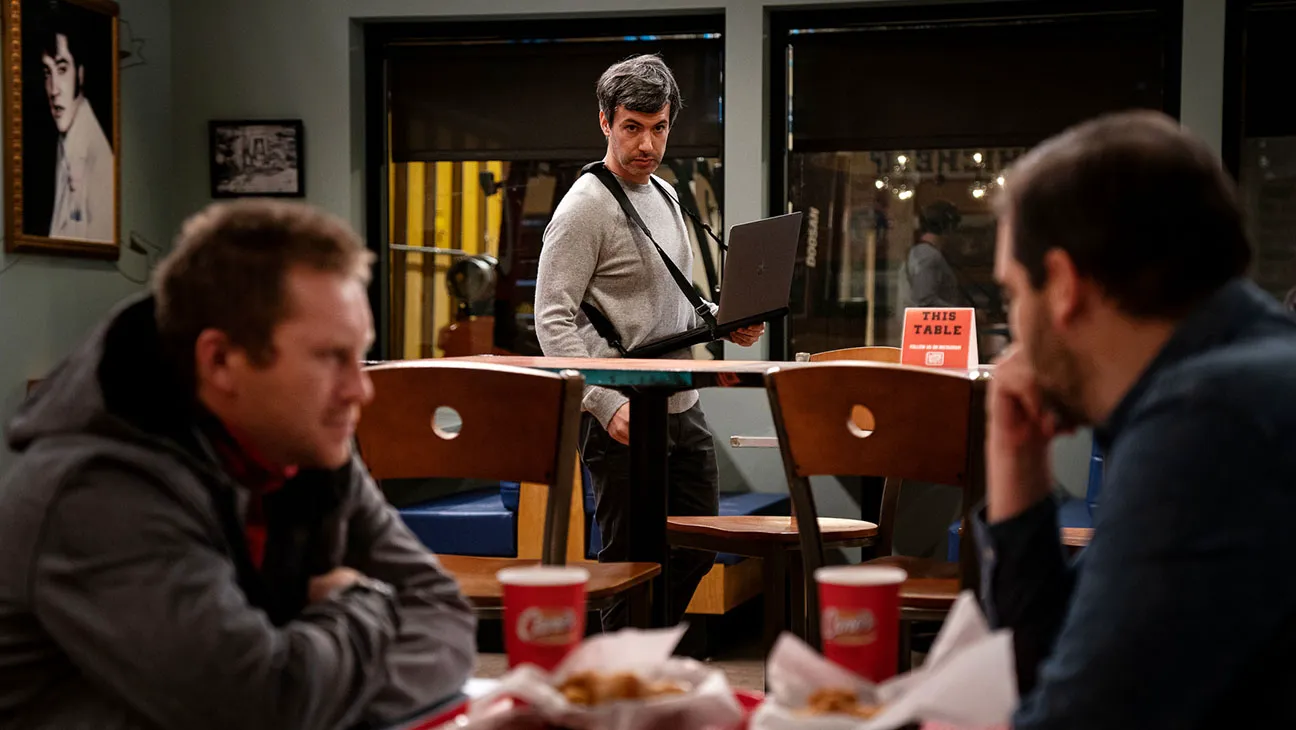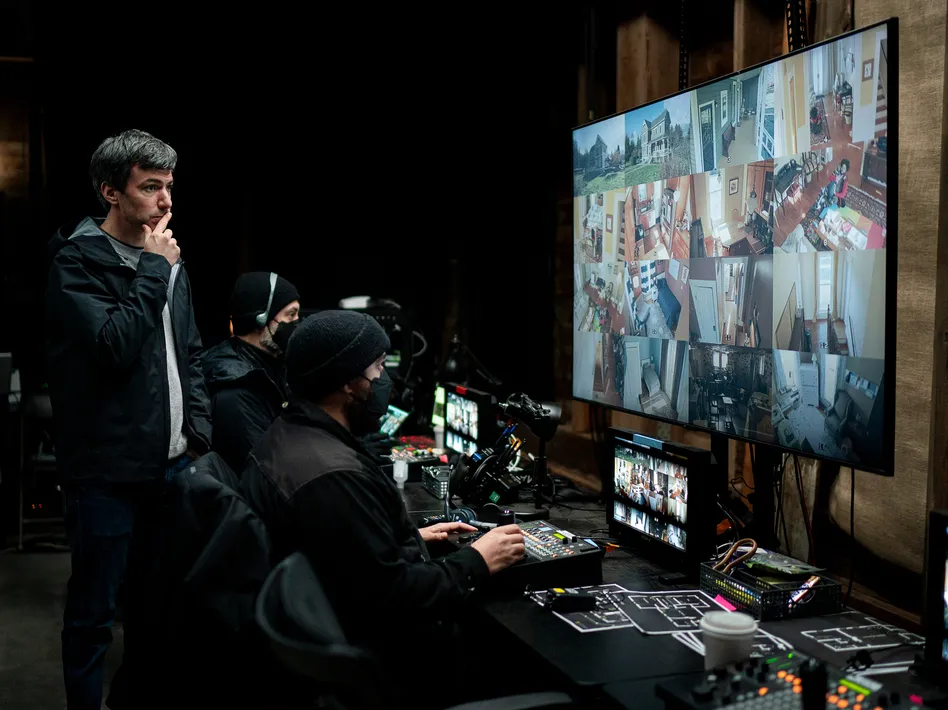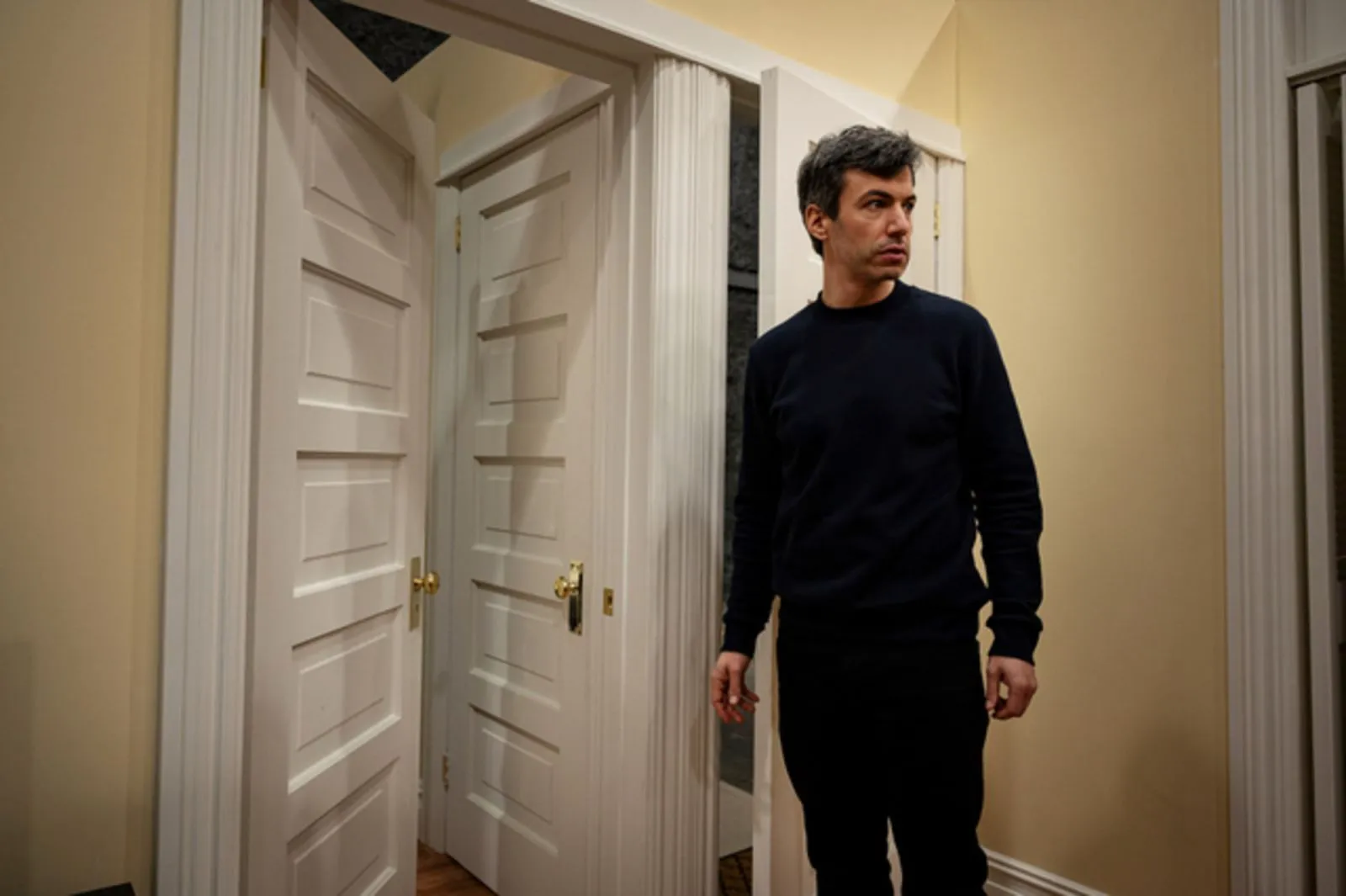If the name Nathan Fielder doesn’t ring a bell, you’ve likely missed out on the brilliant and soon-to-be-cult classic series “Nathan for You,” where the comedian poses as a business consultant. He travels across America, offering entrepreneurs unconventional strategies to boost their revenue – like turning an antique store into a 24/7 operation, attracting drunk patrons from the bar across the street to accidentally break things and be forced to pay up. These offbeat and often questionable ideas were abundant; business owners weren’t always convinced of their success but agreed to give them a shot. After all, they’d already signed up for a show that could easily be mistaken for a magical makeover program.

Nathan Fielder in a scene from “Nathan for You”
However, “Nathan for You” quickly evolved beyond its satirical format, morphing into a unique observational diary where the socially awkward Fielder (it’s unclear where the line blurs between persona and reality) learned to interact with people, imposing his friendship on the entrepreneurs in the process. It was as if the show’s purpose had transformed – not to help businesses, but to seek acceptance. Moreover, the comedian’s penchant for deconstruction played a significant role, a desire to push an idea to the point of absurdity and delve into the meta. In one episode, Fielder hid a reclusive man in a secret location for weeks, while he, in disguise, lived his life: meeting a girl and daring to walk a tightrope between two buildings to impress the crowd. Once the stunt was over, the comedian quietly faded into the background, releasing the man to his new love and the throng of onlookers – he reaped the glory and the kiss. Fielder, meanwhile, stared blankly at the triumph that should have been his.
The Evolution of Fielder’s Absurdity

Nathan Fielder in a scene from “The Rehearsal”
Over four seasons, individual cases from “Nathan for You” garnered national attention – a viral video created for a zoo, featuring a piglet saving a goose, became a sensation. The “Dumb Starbucks” coffee shop, skirting parody laws, was constantly in the news. And a book ghostwritten by a professional about a man who supposedly got in shape by helping movers carry items became an Amazon bestseller. However, the show’s main legacy isn’t the mockery of struggling entrepreneurs or any of the scandals, but rather the reflections on the complex nature of humanity. Sometimes it forces us to yield to others, and sometimes it makes us find reflections of our own fears and traumas in someone else’s story.

Nathan Fielder in a scene from “The Rehearsal”
“The Rehearsal,” the most bizarre and hard-to-explain series in recent years, grew out of this blend of documentary and observation of human behavior. Here, Fielder once again serves as the host, but the protagonists are ordinary people who want to rehearse an upcoming important event. For example, in the first episode, a middle-aged man seeks help because he lied to his friends over 10 years ago about having a master’s degree and now wants to reveal the truth. At least to one friend – the most spiteful and unpredictable one. The protagonist is offered a solution that’s simple in theory but wild in practice: the show’s creators will build realistic sets where the conversation will take place, and an actress, having met that friend under false pretenses, will play her. Rehearsals will create the perfect plan of action that will definitely end in success.
“The Rehearsal”: Reality or Elaborate Illusion?
However, the unusual concept is just the surface of “The Rehearsal.” The series is much more complex, cringeworthy, and absurd than the idea of helping people rehearse specific moments in their lives. Fielder once again portrays himself as an awkward person who often doesn’t understand the mechanics of communication – the series begins with this admission. He himself uses the show’s services – deceptively recreating the first participant’s apartment to prepare jokes and have the perfect meeting with him. He also forces the protagonists to experience the same moral dilemma that their interlocutors will face during the important conversation. That bachelor without a master’s degree will have a choice – to forgive or not to forgive Fielder, who “deceived” him during the rehearsals.

Nathan Fielder in a scene from “The Rehearsal”
The longer this six-episode project goes on, the harder it becomes to distinguish reality from the creator’s sick fantasy. I don’t want to reveal later details of the show, just know that the only thing you can compare what’s happening to is the film “Synecdoche, New York.” In Charlie Kaufman’s film, a depressive playwright recreated the city in a pavilion and put actors playing real people there. Fielder, in turn, becomes the main participant in “The Rehearsal” – surrounding himself with actors, teaching people to live other people’s lives, trying to become another person to look at himself from the outside, and replaying certain moments dozens of times. At some point, you start to lose the logic of what’s happening and grab your head, but you still can’t tear yourself away from the screen – it’s impossible not to watch with delight as Fielder embodies the wildest and most ridiculous ideas.
The Unexpected Heart of “The Rehearsal”
Despite its experimental nature, “The Rehearsal,” like “Nathan for You,” doesn’t feel like a soulless formalist exercise. On the contrary, after watching it, the series remains in your memory as a down-to-earth, humane, and even naive story that celebrates the unpredictability of life. Of course, you can calculate any outcome of a conversation, recreate reality around you, and populate it with doubles, but that will never replace the improvised and random moments that cannot be predicted. All that will remain in your memory is a randomly thrown, but such a sincere “I love you,” and not dozens of attempts to repeat a phrase that turns into an actor’s insensitive remark.